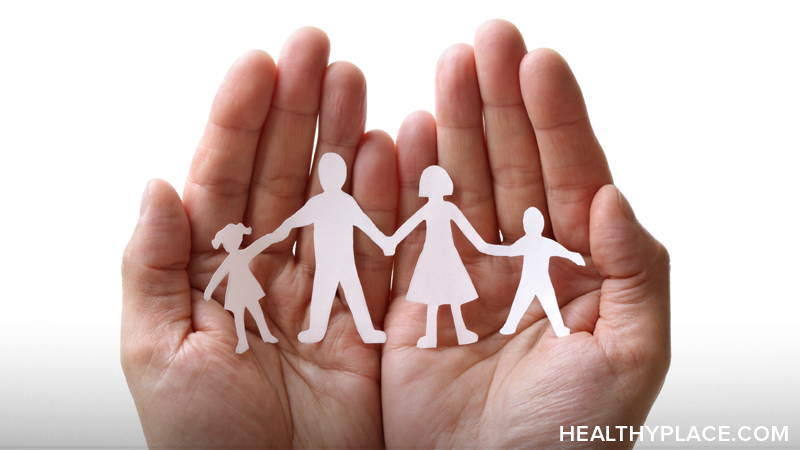Schizophrenia and Family: Coping with Schizophrenia

Schizophrenia and family issues go hand-in-hand. Both children and young adults can develop the disorder (see Schizophrenia in Children: Symptoms, Causes, Treatments). People with schizophrenia experience a profoundly distorted reality, commonly accompanied by hallucinations, paranoid delusions, language disturbances, fragmented thought patterns, and several other disturbing symptoms.
Frequently, family members who care for their afflicted loved one experience a myriad of issues: mental stress, anxiety, self-doubt, exhaustion, frustration, and loss of social connections. Others blame the mentally ill person – developing resentment toward them, accusing them of selfishness and even sabotaging treatment strategies put in place by physicians.
Who Is Affected By Schizophrenia?
You might ask yourself the question: who is affected by schizophrenia? The answer: everyone in the immediate family of the person with schizophrenia as well as extended family, friends, professional acquaintances – virtually anyone who comes in contact with the family unit on a regular basis.
The person suffering from schizophrenia can no longer live as independently as he or she did prior to onset (see Living with Schizophrenia). Family members, charged with caring for the person, must adjust their personal and professional schedules while becoming educated about the disorder and learning to cope with its effects on family dynamics.
Other relatives living in the same home with the mentally ill person, such as elderly parents or younger children, are thrust into unexpected levels of independence and responsibility. These rapidly changing roles and lifestyles can thrust a family into turmoil they don’t know how to overcome.
Coping With Schizophrenia – Keys to Recovery
The steps required in coping with schizophrenia also provide the keys to recovery for family members and the schizophrenic alike. Each family will develop their own style and toolbox for coping with the ravages of this debilitating illness, but the basics remain the same for all:
- Everyone involved must find the strength to accept the reality of this illness and the challenges it brings. Realize and believe that no one is to blame – not parents, siblings, outsiders, or major events in the past. Until you complete this step, you cannot offer help to your mentally ill loved one or your other family members.
- Educate yourself, other family members, and the patient about the disorder. Learn as much as possible about the physiological and biochemical imbalances that accompany schizophrenia as well as how the afflicted person experiences the symptoms. Know about available schizophrenia treatment options, adjunct therapies, and community support groups that offer schizophrenia help.
- Enforce medication compliance. People with schizophrenia cannot simply “snap out of it” or “pull themselves up by their bootstraps”. Control of paranoid delusions, distorted thought patterns, aural and visual disturbances, insomnia, and other symptoms require potent prescription medication. Encourage your loved one to embrace the help the medication offers and work to ensure that he or she takes the drugs as directed and on schedule.
- Seek outside support. Schizophrenia support groups for both patients and families exist all over the United States. Ask the doctor or therapist to recommend several of these resources for your family. Plan to attend a support group in your area where you and your loved one can interact with other people – face to face. It may also help to participate in some moderated, online schizophrenia support forums, but use these as an accompaniment to your regular group meetings.
- Develop a trusting, honest relationship with mental health professionals involved in the recovery of the schizophrenic patient. Recovering and relapse prevention depends on the strength and integrity of these relationships. If you find that you simply cannot form an appropriate bond with the doctor and therapist, seek others that suit your personality and needs more effectively.
Working on these basic steps required for coping with schizophrenia from the very beginning will lay the foundation necessary to provide a more stable environment for your family. You’ll need to mindfully observe what strategies and schedules work best for the person with schizophrenia and other family members.
Keep a schizophrenia journal of these observations and adjust your strategy and lifestyle accordingly. The journal can also serve as a cathartic tool for relieving internal struggles and recording victories. Your family can learn to cope with the challenges that come with schizophrenia in a healthy way that actually strengthens familial bonds, rather than chipping away at them. Believe that, work toward that end, and this disease will lose its power to destroy.
APA Reference
Gluck, S.
(2021, December 16). Schizophrenia and Family: Coping with Schizophrenia, HealthyPlace. Retrieved
on 2025, November 25 from https://www.healthyplace.com/thought-disorders/schizophrenia-support/schizophrenia-and-family-coping-with-schizophrenia


